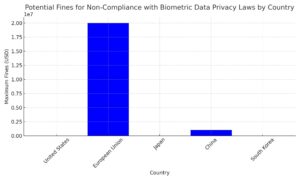Biometric data is unique physical or behavioral characteristics that can be used to identify individuals, such as fingerprints, facial recognition data, and iris scans. It is becoming increasingly prevalent in modern technology. Biometric authentication is replacing traditional passwords and PINs in many systems.
However, the collection, storage, and use of biometric data have also raised concerns about privacy and security. This has led to regulations worldwide.

Understanding biometric data privacy laws is crucial for individuals, organizations, and governments alike. These laws dictate how biometric data can be collected, stored, and used. They also dictate how it must be protected from unauthorized access and disclosure.
Failure to comply with these laws can result in significant legal and financial consequences, including fines and reputational damage. With biometric technology becoming more widespread, it is essential to stay up-to-date with the latest biometric data privacy laws worldwide.
This article will provide an overview of these laws and their implications for individuals, organizations, and governments. It will examine the key issues surrounding biometric data privacy, including consent, data retention, and data sharing. It will also explore the measures that can be taken to ensure compliance with these laws.
| Country | Law | Key Requirements | Fines for Non-compliance |
|---|---|---|---|
| United States | Illinois BIPA | Written consent, written policy, secure storage | Up to $5,000 per violation |
| European Union | GDPR | Explicit consent, right to access/delete, secure storage | Up to 4% of annual revenue or €20 million |
| Japan | Act on the Protection of Personal Information | Regulates collection, use, storage of personal info | Not specified |
| China | Cybersecurity Law | Regulates collection, use, storage of personal info | Up to 1 million RMB or 10 times the illegal income |
| South Korea | Personal Information Protection Act | Regulates collection, use, storage of personal info | Up to 3% of annual revenue |
Global Overview of Biometric Data Privacy Laws

Biometric data refers to unique physical or behavioral characteristics that can be used to identify individuals, such as fingerprints, facial recognition data, and iris scans. However, collecting, storing, and using biometric data have also raised concerns about privacy and security, leading to regulations worldwide.
United States: BIPA and State Laws
In the United States, biometric data privacy laws are primarily governed by state laws. Illinois was the first state to enact a biometric privacy law, the Biometric Information Privacy Act (BIPA). This law regulates the collection, use, and storage of biometric identifiers. Texas and Washington have also enacted similar laws.
Under BIPA, companies must obtain written consent from individuals before collecting and storing their biometric information. Companies must also provide a written policy that explains how they will handle the biometric data. Lastly, they must securely store the data.
European Union: GDPR
The General Data Protection Regulation (GDPR) governs data privacy in the European Union (EU) and applies to biometric data. The GDPR requires companies to obtain explicit consent from individuals before collecting, processing, and storing their biometric data. Companies must also provide individuals with the right to access and delete their biometric data.
The GDPR also requires companies to implement technical and organizational measures to protect biometric data from unauthorized access, theft, or loss. Companies that violate the GDPR can face significant fines.
Asia-Pacific: Varied Approaches
In Asia-Pacific, biometric data privacy laws vary by country. For example, Japan has enacted the Act on the Protection of Personal Information, which regulates the collection, use, and storage of personal information, including biometric data.
China has also enacted the Cybersecurity Law, which regulates the collection, use, and storage of personal information, including biometric data. Similarly, South Korea has enacted the Personal Information Protection Act, which regulates the collection, use, and storage of personal information, including biometric data.
Overall, biometric data privacy laws are becoming more prevalent worldwide as the use of biometric identifiers becomes more widespread. Companies that collect and store biometric data must comply with these laws to protect individuals’ privacy and avoid significant fines and penalties.
Key Principles and Rights in Biometric Data Protection

Biometric data, such as fingerprints, facial recognition, and iris scans, are unique personal identifiers that are being increasingly used for security and identification purposes. However, the use of biometric data raises significant privacy concerns, and many countries have enacted laws to regulate its collection, processing, and storage.
Consent and Explicit Consent
One of the key principles in biometric data protection is obtaining consent from the individual whose data is being collected. Consent should be informed, freely given, and specific to the purpose for which the data is being collected. In some countries, such as the European Union, explicit consent is required for the processing of biometric data.
Transparency and Accountability
Transparency is another key principle in biometric data protection. Individuals should be informed about the collection, processing, and storage of their biometric data, including the purpose for which it will be used. Organizations that collect and process biometric data should be accountable for their actions. They should also implement appropriate security measures to protect the data from unauthorized access or disclosure.
Data Minimization and Storage Limitation
Data minimization and storage limitation are also important principles in biometric data protection. Organizations should only collect and process biometric data that is necessary for the purpose for which it is being collected. They should also limit the storage of biometric data to the minimum amount of time necessary to achieve the purpose for which it was collected.
Challenges and Considerations in Compliance
Complying with biometric data privacy laws worldwide can be a challenging task for organizations. The following subsections explore some of the major challenges and considerations in compliance.
Technological Advances and Innovation
Technological advances and innovation have made it easier to collect, store, and process biometric data. However, these advances have also created new security and privacy risks.
Organizations must ensure that their biometric data collection and processing systems are secure and comply with relevant privacy laws. They must also keep up to date with technological advances and innovation to ensure that their systems remain secure and compliant.
Balancing Security with Privacy
Balancing security with privacy is a key consideration in compliance with biometric data privacy laws. Organizations must ensure that their biometric data collection and processing systems are secure and protect individuals’ privacy rights.
They must also ensure that their systems are not overly invasive and do not compromise individuals’ privacy rights. The challenge is to strike a balance between security and privacy that complies with relevant privacy laws.
Legal Obligations and Penalties
Organizations must comply with relevant biometric data privacy laws and regulations. Failure to comply with these laws can result in fines, penalties, and legal action.
For example, the General Data Protection Regulation (GDPR) imposes fines of up to 4% of an organization’s global annual revenue or €20 million, whichever is greater, for non-compliance.
Implications for Stakeholders
Biometric data privacy laws have far-reaching implications for various stakeholders, including businesses, consumers, and governments. This section highlights the impact of biometric data privacy laws on these stakeholders.
Impact on Businesses and Finance
Businesses that collect and use biometric data are required to comply with biometric data privacy laws worldwide. Failure to comply with these laws can result in significant financial penalties and reputational damage. Biometric data breaches can also lead to legal action and class-action lawsuits.
Therefore, businesses must ensure that they have appropriate policies and procedures in place to protect biometric data.
Moreover, biometric data privacy laws can also impact the financial sector. For example, financial institutions that use biometric data for authentication purposes must comply with biometric data privacy laws. Non-compliance can result in significant financial penalties and reputational damage.
Consumer Awareness and Privacy Concerns
Biometric data privacy laws have raised consumer awareness about the privacy risks associated with biometric data collection and use. Consumers are becoming increasingly concerned about the security of their biometric data and are demanding more transparency and control over its use.
Therefore, businesses must ensure that they are transparent about their biometric data collection and use practices and obtain consumers’ consent before collecting their biometric data.
Additionally, biometric data privacy laws have highlighted the importance of data privacy and security. Consumers are more aware of the privacy risks associated with data breaches and are demanding that businesses take appropriate measures to protect their data.
Government Surveillance and Law Enforcement
Biometric data privacy laws have also impacted government surveillance and law enforcement. Governments around the world are increasingly using biometric data for surveillance and law enforcement purposes.
However, biometric data privacy laws require governments to ensure that they have appropriate safeguards in place to protect individuals’ privacy rights.
Moreover, biometric data privacy laws have also limited the use of biometric data by law enforcement agencies. For example, in the United States, the use of biometric data by law enforcement agencies is limited by the Fourth Amendment.
The Fourth Amendment requires law enforcement agencies to obtain a warrant before conducting a search or seizure of biometric data.
Video Guide
Frequently Asked Questions
What constitutes sensitive biometric data under the GDPR?
The General Data Protection Regulation (GDPR) defines biometric data as “personal data resulting from specific technical processing relating to the physical, physiological, or behavioral characteristics of a natural person, which allow or confirm the unique identification of that natural person.” Sensitive biometric data under the GDPR includes facial recognition data, fingerprints, iris scans, and other unique physical or behavioral characteristics that can be used to identify individuals.
How do privacy laws in the US compare to the GDPR in terms of biometric data protection?
The United States does not have a federal law that specifically regulates the collection, storage, and use of biometric data. However, several states have enacted their own biometric data privacy laws, including Illinois’ Biometric Information Privacy Act. Compared to the GDPR, US privacy laws provide less comprehensive protection for biometric data.
What are some common examples of biometric data that are protected by privacy laws?
Biometric data protected by privacy laws includes facial recognition data, fingerprints, iris scans, voiceprints, and other unique physical or behavioral characteristics that can be used to identify individuals.
Are there specific regulations governing the storage and use of biometric data by governments?
Many countries have specific regulations governing the storage and use of biometric data by governments. For example, in India, the Aadhaar Act regulates the collection and use of biometric data by the government for the purpose of issuing a unique identification number to residents. In the United States, the Privacy Act of 1974 regulates the collection, use, and dissemination of personal information by federal agencies.
How do biometric data collection laws vary across different countries?
Biometric data collection laws vary widely across different countries. Some countries, such as India, have enacted comprehensive laws regulating the collection, storage, and use of biometric data. Meanwhile, others, such as the United States, have less comprehensive regulations. Countries with a strong focus on privacy tend to have more comprehensive biometric data collection laws.
Does the GDPR provide a framework for biometric data privacy that can be applied internationally?
The GDPR provides a framework for biometric data privacy that can be applied internationally. The regulation applies to any organization that processes the personal data of EU residents, regardless of where the organization is located. As a result, organizations that collect, store, and use biometric data must comply with the GDPR’s requirements, even if they are located outside the EU.











